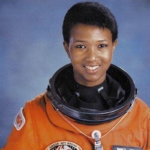
Eileen Collins, the retired NASA astronaut, is the first woman to command and pilot a space shuttle. An incredible accomplishment highlighted in TIME Magazine’s Firsts Edition on Women changing the World.
Here is The Pilot’s Full Interview:
“This isn’t just about me”
I decided I wanted to be an astronaut in fourth grade. I remember reading an article in Junior Scholastic about the Gemini program. I don’t remember consciously feeling like I couldn’t do it because they were all men and I was a young girl. I remember thinking, I’ll just be a woman astronaut.
It wasn’t until high school that I realized it would be impossible for me to be an astronaut as a woman. I remember very distinctly that I didn’t tell anyone I wanted to be an astronaut because I didn’t want anyone to tell me, “You can’t do that.” I didn’t want to hear it. So I kept it inside. Even when I was in college and joined ROTC, I knew the end horizon was the astronaut program, but I never told anyone.
When I joined the Air Force, I was in the first class to have women go through pilot training at Vance Air Force Base, in Enid, Okla. I think there were 450 pilots on that base, and we were the first four women. The Air Force was testing whether women could succeed as military pilots. We obviously were living in a fishbowl—everyone knew who we were, our personal business, our test scores and our flight performance. My philosophy was to be the best pilot I could be—to stay focused, not engage or get involved in social things or anything that wasn’t directly contributing to the mission. It was important for us to excel in training and for the test program to succeed. If the first women did poorly, that could have caused the cancellation of the program.
I must have been on the base for two days when I was checking out the commissary wearing my flight suit. A woman in a flight suit was a strange sight in those days. The woman behind the register said, “Are you one of those new women pilots?” I said yes. She looked at me and said, “The wives don’t want you here.” I was thinking—the guys don’t want us here, the wives don’t want us here. I felt horrible. So I asked her why. She said, “They don’t want you going cross-country with their husbands!” This frank interaction helped me see our situation through other people’s eyes. I wanted the women pilots to integrate successfully, so I made it a point to get to know the wives.
While at Vance, in 1978, the first class of space-shuttle astronauts visited for three days of parachute training. I never met any of them, but everybody was talking about them. That’s when I decided to apply to the space-shuttle program as soon as I was eligible. I knew that all the women in the program were mission specialists, not pilots. I also knew that to be a shuttle pilot you had to be a test pilot. So I applied to test-pilot school. That’s when I knew I could be the first woman shuttle pilot, because there were very few women ahead of me in the pipeline in the Air Force or the Navy.
In 1990 I learned that I was going to pilot the space shuttle when Duane Ross at NASA called me. He handed me off to [commander of the Apollo 16 mission] John Young. I asked, “Am I going to be a pilot or a mission specialist?” He said, “You’re going to be a pilot. You will be the first woman pilot of the space shuttle.” John Young is one of my heroes; he not only walked on the moon but was the first person to land the space shuttle. I hung up the phone. I didn’t feel like jumping up and down or partying. I felt a sense of relief, a huge sense of calmness.
After my first mission, I was visiting a group of women at Kennedy Space Center. One woman said, “Thank you for doing what you are doing, because it makes guys respect us more.” That hit me between the eyes. I thought, Why didn’t I think of that before? This isn’t just about me. This is really a big, big deal.
I advise others to take on challenges, even if you think they are too hard, even if you think you might fail. When you become an old person and look back on your life you may say, “I wish I had tried that”—you don’t want to be in that position. Give yourself challenges that are exciting, and be available to help others. There is no better feeling than helping someone else.
Watch the interview on time.com.





